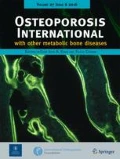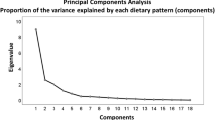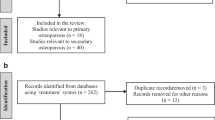Abstract
Summary
We tested the hypothesis that low leptin and high adiponectin levels are associated with higher rates of bone mineral density (BMD) loss among 3,075 men and women, aged 70–79, from the Health Aging and Body Composition Study. Results suggest that adiponectin, but not leptin, is a risk factor for bone loss in women.
Introduction
Adiponectin and leptin are hormones secreted by adipose cells that may impact BMD. Few studies have evaluated the longitudinal association of leptin and adiponectin levels with rates of BMD change.
Methods
Hip and whole-body areal BMD (aBMD) were measured five times using dual-energy X-ray absorptiometry over 10 years (average follow-up time, 7.95 ± 1.92 years). Trabecular lumbar spine volumetric BMD (vBMD) was measured using quantitative computed topography at baseline and year 6 in the Pittsburgh cohort only. Random slope and intercept models were used to account for within person correlation as a result of repeated measures of hip and whole-body aBMD. Linear regression was used to model changes in spine trabecular vBMD.
Results
Among women, the annualized rate of hip aBMD loss in the highest tertile of adiponectin was −0.67% (95% CI −0.77, −0.58) compared to [−0.43% (95% CI −0.51, −0.35)] in the lowest tertile (p trend = 0.019) after adjusting for age, race, BMI, diabetes, baseline hip aBMD, and weight change. In men, hip aBMD loss was greatest in the high adiponectin group (tertile 3), however this association was not significant (p trend = 0.148). After adjusting for weight change in women, the association between higher leptin and lower hip aBMD loss was attenuated and no longer significant (p trend = 0.134). Leptin and adiponectin levels were not associated with whole-body aBMD or trabecular lumbar spine vBMD loss.
Conclusions
Adiponectin was associated with increased hip aBMD loss in women only, supporting evidence that adiponectin may have an important role in bone health.
Similar content being viewed by others
References
Spiegelman BM, Flier JS (2001) Obesity and the regulation of energy balance. Cell 104:531–543
Henry BA, Goding JW, Alexander WS et al (1999) Central administration of leptin to ovariectomized ewes inhibits food intake without affecting the secretion of hormones from the pituitary gland: evidence for a dissociation of effects on appetite and neuroendocrine function. Endocrinology 140:1175–1182
Hinoi E, Gao N, Jung DY et al (2009) An osteoblast-dependent mechanism contributes to the leptin regulation of insulin secretion. Ann N Y Acad Sci 1173(Suppl 1):E20–E30
Handschin AE, Trentz OA, Hemmi S et al (2007) Leptin increases extracellular matrix mineralization of human osteoblasts from heterotopic ossification and normal bone. Ann Plast Surg 59:329–333
Scariano JK, Garry PJ, Montoya GD, Chandani AK, Wilson JM, Baumgartner RN (2003) Serum leptin levels, bone mineral density and osteoblast alkaline phosphatase activity in elderly men and women. Mech Aging Dev 124:281–286
Goldstone AP, Howard JK, Lord GM et al (2002) Leptin prevents the fall in plasma osteocalcin during starvation in male mice. Biochem Biophys Res Commun 295:475–481
Hamrick MW, la-Fera MA, Choi YH, Pennington C, Hartzell D, Baile CA (2005) Leptin treatment induces loss of bone marrow adipocytes and increases bone formation in leptin-deficient ob/ob mice. J Bone Miner Res 20:994–1001
Ducy P, Amling M, Takeda S et al (2000) Leptin inhibits bone formation through a hypothalamic relay: a central control of bone mass. Cell 100:197–207
Lorentzon M, Landin K, Mellstrom D, Ohlsson C (2006) Leptin is a negative independent predictor of areal BMD and cortical bone size in young adult Swedish men. J Bone Miner Res 21:1871–1878
Morberg CM, Tetens I, Black E et al (2003) Leptin and bone mineral density: a cross-sectional study in obese and nonobese men. J Clin Endocrinol Metab 88:5795–5800
Pasco JA, Henry MJ, Kotowicz MA et al (2001) Serum leptin levels are associated with bone mass in nonobese women. J Clin Endocrinol Metab 86:1884–1887
Ruhl CE, Everhart JE (2002) Relationship of serum leptin concentration with bone mineral density in the United States population. J Bone Miner Res 17:1896–1903
Blain H, Vuillemin A, Guillemin F et al (2002) Serum leptin level is a predictor of bone mineral density in postmenopausal women. J Clin Endocrinol Metab 87:1030–1035
Jurimae J, Jurimae T, Leppik A, Kums T (2008) The influence of ghrelin, adiponectin, and leptin on bone mineral density in healthy postmenopausal women. J Bone Miner Metab 26:618–623
Jurimae J, Kums T, Jurimae T (2009) Adipocytokine and ghrelin levels in relation to bone mineral density in physically active older women: longitudinal associations. Eur J Endocrinol 160:381–385
Weiss LA, Barrett-Connor E, von MD, Clark P (2006) Leptin predicts BMD and bone resorption in older women but not older men: the Rancho Bernardo study. J Bone Miner Res 21:758–764
Chanprasertyothin S, Saetung S, Payattikul P, Rajatanavin R, Ongphiphadhanakul B (2006) Relationship of body composition and circulatory adiponectin to bone mineral density in young premenopausal women. J Med Assoc Thai 89:1579–1583
Yamauchi T, Kamon J, Waki H et al (2001) The fat-derived hormone adiponectin reverses insulin resistance associated with both lipoatrophy and obesity. Nat Med 7:941–946
Goldstein BJ, Scalia R (2004) Adiponectin: a novel adipokine linking adipocytes and vascular function. J Clin Endocrinol Metab 89:2563–2568
Pischon T, Girman CJ, Hotamisligil GS, Rifai N, Hu FB, Rimm EB (2004) Plasma adiponectin levels and risk of myocardial infarction in men. JAMA 291:1730–1737
Spranger J, Kroke A, Mohlig M et al (2003) Adiponectin and protection against type 2 diabetes mellitus. Lancet 361:226–228
Yatagai T, Nagasaka S, Taniguchi A et al (2003) Hypoadiponectinemia is associated with visceral fat accumulation and insulin resistance in Japanese men with type 2 diabetes mellitus. Metabolism 52:1274–1278
Berner HS, Lyngstadaas SP, Spahr A et al (2004) Adiponectin and its receptors are expressed in bone-forming cells. Bone 35:842–849
Luo XH, Guo LJ, Xie H et al (2006) Adiponectin stimulates RANKL and inhibits OPG expression in human osteoblasts through the MAPK signaling pathway. J Bone Miner Res 21:1648–1656
Basurto L, Galvan R, Cordova N et al (2009) Adiponectin is associated with low bone mineral density in elderly men. Eur J Endocrinol 160:289–293
Gonnelli S, Caffarelli C, Del SK et al (2008) The relationship of ghrelin and adiponectin with bone mineral density and bone turnover markers in elderly men. Calcif Tissue Int 83:55–60
Jurimae J, Jurimae T (2007) Adiponectin is a predictor of bone mineral density in middle-aged premenopausal women. Osteoporos Int 18:1253–1259
Richards JB, Valdes AM, Burling K, Perks UC, Spector TD (2007) Serum adiponectin and bone mineral density in women. J Clin Endocrinol Metab 92:1517–1523
Michaelsson K, Lind L, Frystyk J et al (2008) Serum adiponectin in elderly men does not correlate with fracture risk. J Clin Endocrinol Metab 93:4041–4047
Araneta MR, von MD, Barrett-Connor E (2009) Sex differences in the association between adiponectin and BMD, bone loss, and fractures: the Rancho Bernardo study. J Bone Miner Res 24:2016–2022
Dennsion EM et al (2004) Plasma leptin concentration and change in bone density among elderly men and women: the Hertfordshire Cohort Study. Calcif Tissue Int 74:401–406
Pahor M, Chrischilles EA, Guralnik JM, Brown SL, Wallace RB, Carbonin P (1994) Drug data coding and analysis in epidemiologic studies. Eur J Epidemiol 10:405–411
Ainsworth BE, Haskell WL, Whitt MC et al (2000) Compendium of physical activities: an update of activity codes and MET intensities. Med Sci Sports Exerc 32:S498–S504
Zoico E, Zamboni M, Adami S et al (2003) Relationship between leptin levels and bone mineral density in the elderly. Clin Endocrinol (Oxf) 59:97–103
Thomas T, Burguera B, Melton LJ III et al (2001) Role of serum leptin, insulin, and estrogen levels as potential mediators of the relationship between fat mass and bone mineral density in men versus women. Bone 29:114–120
Yamauchi M, Sugimoto T, Yamaguchi T et al (2001) Plasma leptin concentrations are associated with bone mineral density and the presence of vertebral fractures in postmenopausal women. Clin Endocrinol (Oxf) 55:341–347
Barbour KE, Zmuda JM, Boudreau R et al (2011) Adipokines and the risk of fracture in older adults. J Bone Miner Res 26:1568–1576
Ealey KN, Kaludjerovic J, Archer MC, Ward WE (2008) Adiponectin is a negative regulator of bone mineral and bone strength in growing mice. Exp Biol Med (Maywood) 233:1546–1553
Johansson C, Black D, Johnell O, Oden A, Mellstrom D (1998) Bone mineral density is a predictor of survival. Calcif Tissue Int 63:190–196
Role of Funding Source
The Health Aging and Body Composition Study (Health ABC) includes the contract numbers: N01-AG-6-2101, N01-AG-6-2103, N01-AG-6-2106, and R01-AG028050. This research was supported in part by the Intramural Research Program of the NIH, National Institute on Aging.
Conflicts of interest
None.
Author information
Authors and Affiliations
Consortia
Corresponding author
Rights and permissions
About this article
Cite this article
Barbour, K.E., Zmuda, J.M., Boudreau, R. et al. The effects of adiponectin and leptin on changes in bone mineral density. Osteoporos Int 23, 1699–1710 (2012). https://doi.org/10.1007/s00198-011-1768-x
Received:
Accepted:
Published:
Issue Date:
DOI: https://doi.org/10.1007/s00198-011-1768-x




